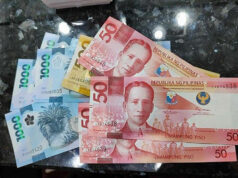JADAM: Ultra low cost agriculture
PHILIPPINE gross domestic product (GDP) increased by 6.9% in the third quarter but agriculture grew at a slower pace at 2.5% verses 3.0% in 2016. Still, agriculture showed a better growth of 4.6% versus -1.3% in 2016.
Eman Bundoc was an overseas Filipino worker who returned home when his father who got sick of cancer died, followed by his mother a year after, then his sibling, who all tended their farm in Bulacan. They were supposed to be healthy eating their farm produce. When he took over the farm, he changed from using chemicals to the natural farming method, making his own fertilizers, thus, reducing his cost. Dodong Cacanando of Bukidnon found his expenses went up during the Asian financial crisis with the higher cost of fertilizers. He turned to natural farming, made his own fertilizers, also lowering his cost.
Natural farming is “revolutionary” as it is do it yourself. It empowers farmers to make their own fertilizers with what is abundant in their area. Do you know that you can make your own fertilizers from plants abundant in the farm such as banana trunks, common vegetables that grows fast such as camote, alugbati, talinum, etc.? Do you know that you can make your own indigenous micro-organisms (IMO) that are effective and cheap with only rice (the cheapest you can find) and molasses? The finished product IMO is feed for the soil, good to shoo away flies and remove bad odors anywhere, even in pig pens.
Joji and Andry Lim invited Rei Yoon, a Korean principal researcher, English translator of the book JADAM by Young-san Cho, the son of Han-kyu Cho, the father of Korean Natural Farming. Young-san Cho developed JADAM by combining scientific knowledge with traditional Asian farming and his father’s natural farming. What does Hang-kyu say of his son? He said that “while natural farming is the foundation, Young-san went further, for JADAM is a step forward, it is ultra low cost and it works!”
Last month, Rei Yoon did four workshops: TMFI in Davao (Mindanao), Bohol State University (Visayas), Terra Verde in Cavite and Flor’s Garden Antipolo (Luzon). All participants in the workshops were “JADAMized” as if it was a “virus”. When the Rizal Organic Agriculture Development were to meet, Nonong Velasco of Organic Options was asked what to take up, he said “Let’s do JADAM!”
So what is JADAM and what is it all about? JADAM is short for “jayonul damn saramdul” a Korean word that means “people who are like nature” or follow the wisdom of nature. Its main priority is to lower the cost of organic farming so that it is within reach for everyone. In conventional farming, farmers buy all their farming requirements from seeds to seedlings, fertilizers, pesticide. Experts tell the farmers when to apply the fertilizer that farmers have lost control of their farming. JADAM brings farming back to the farmers. In JADAM, farmers are taught and empowered to make all the farm inputs they need themselves. The soil is alive. JADAM teaches how to increase microbial diversity, boost soil minerals, and raise soil fertility, among others. It is not only cheap and effective, it is easy and simple to do.
What makes JADAM low cost is that all materials come from the field and doesn’t use any molasses. Young-san believed in his father’s natural farming but considered farms/countries where molasses is expensive or not available. So he developed the JADAM indigenous microorganism solution to culture microorganisms which uses mainly leaf molds, potato or sweet potato and salt. Leaf molds are decomposed leaves, a superior soil conditioner. Leaf mold provides excellent habitat for soil life such as earthworms and beneficial bacteria.
With one-third of the Philippine workforce in agriculture contributing less than 10% to GDP, agriculture can be a real game-changer if productivity goes up. With JADAM’’s Ultra Low Cost as technology, the Agri Mentor Me Program of Agri Go Negosyo, Dr. William Dar’s Inclusive Market Oriented Development, the government’s encouragement on farm tourism, farm learning sites and schools, hopefully the time will soon come when Philippine farmers will be prosperous and progressive.
Flor G. Tarriela is chairman of PNB and a director of FINEX. She was formerly undersecretary of Finance, the first Filipina vice president of Citibank N.A. and past president of BAIPHIL.



